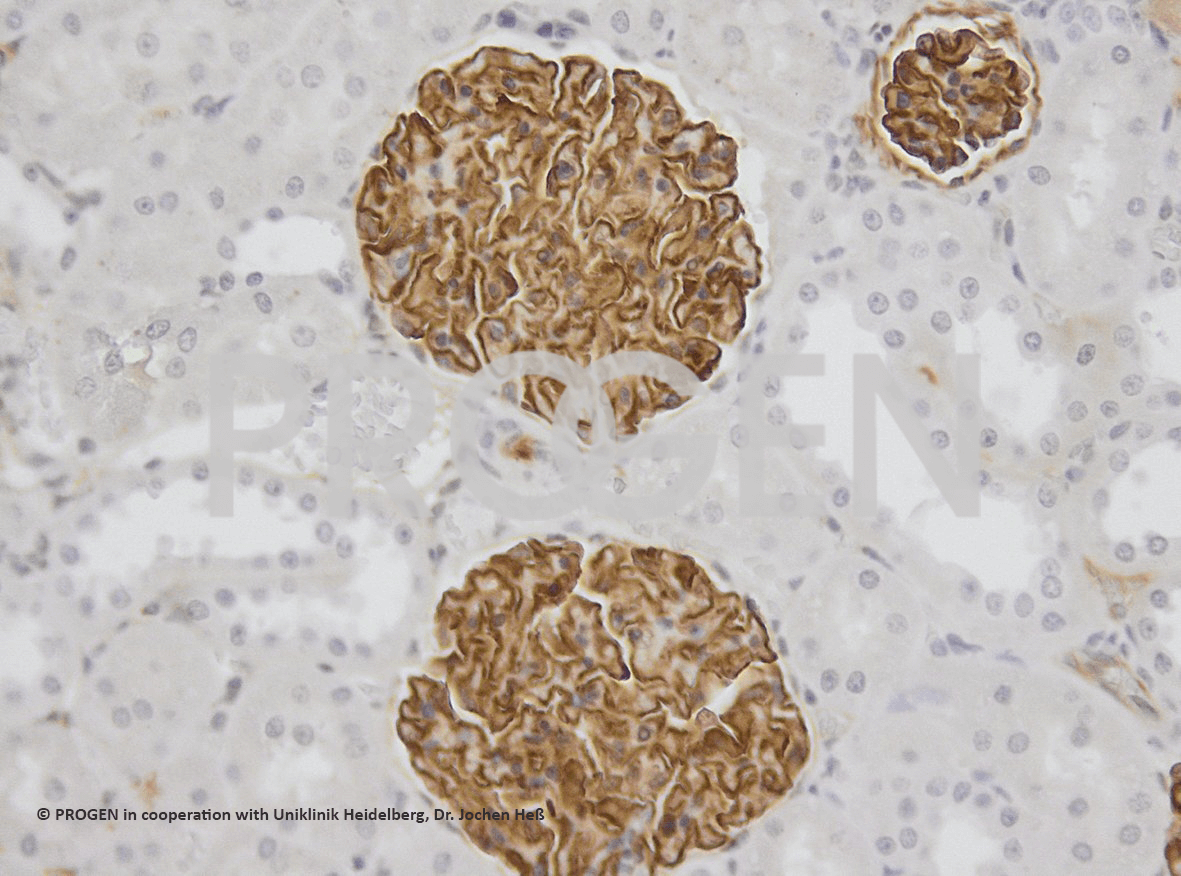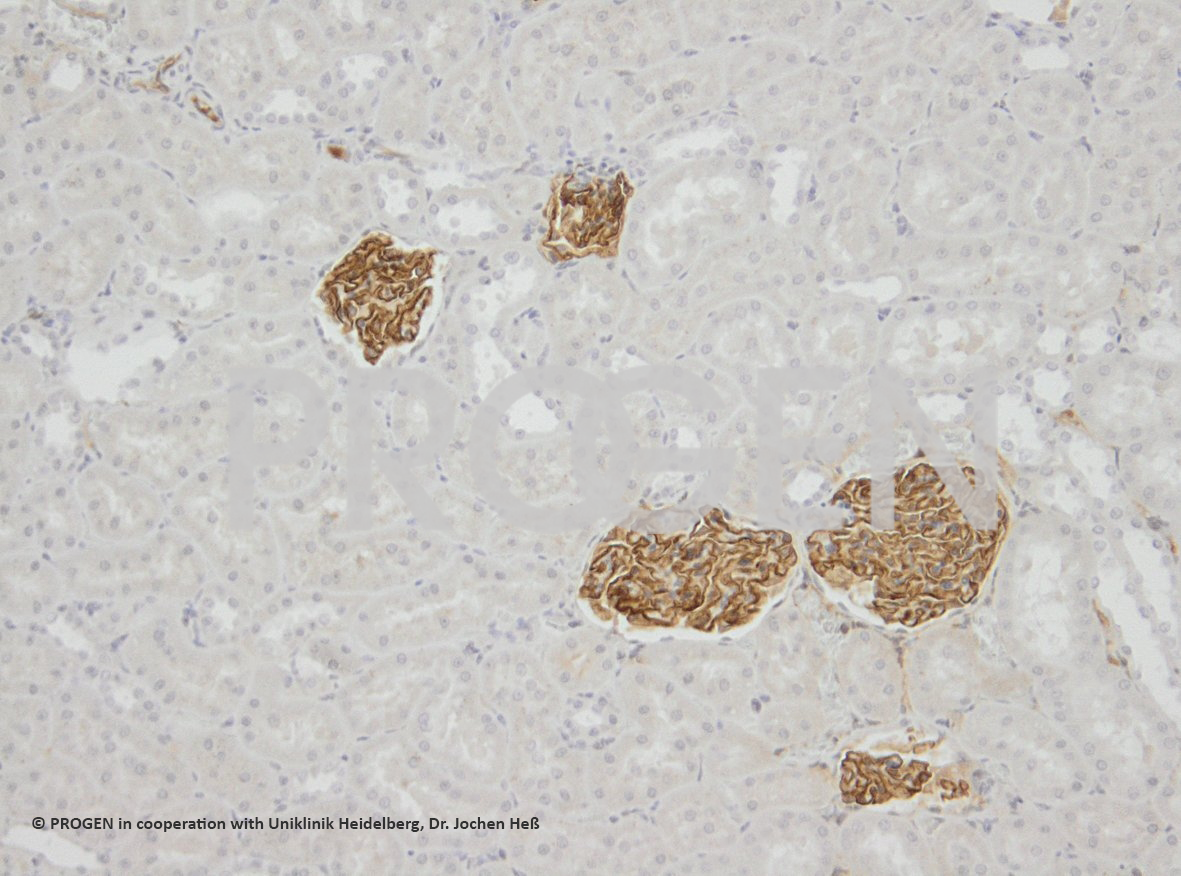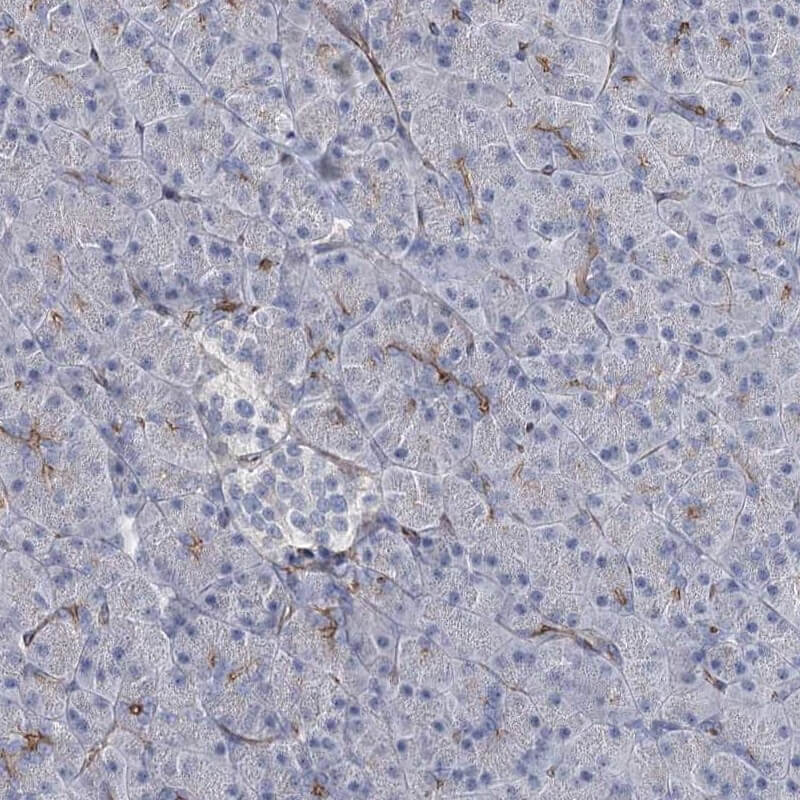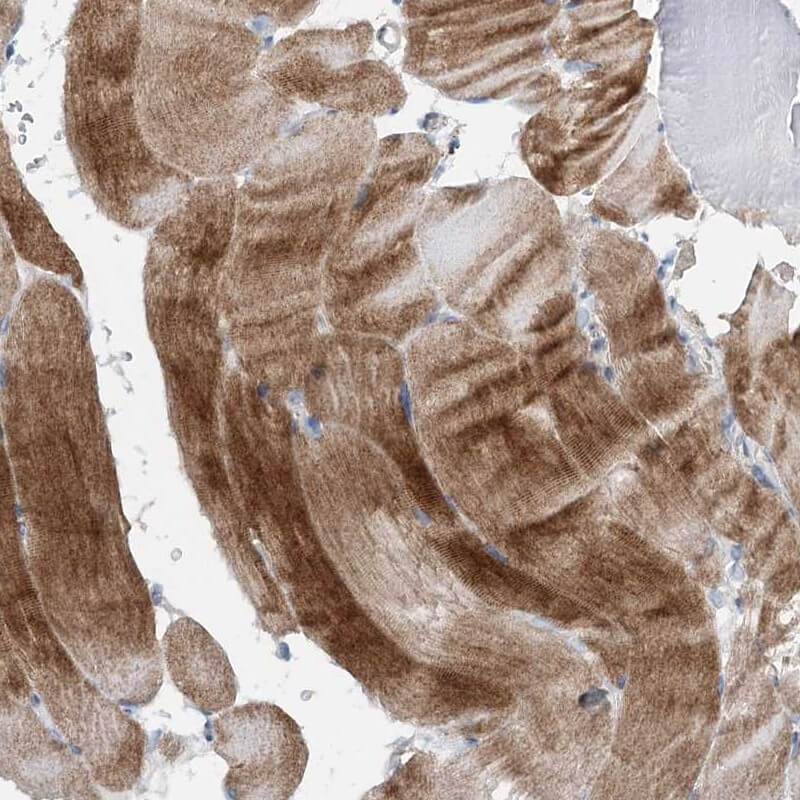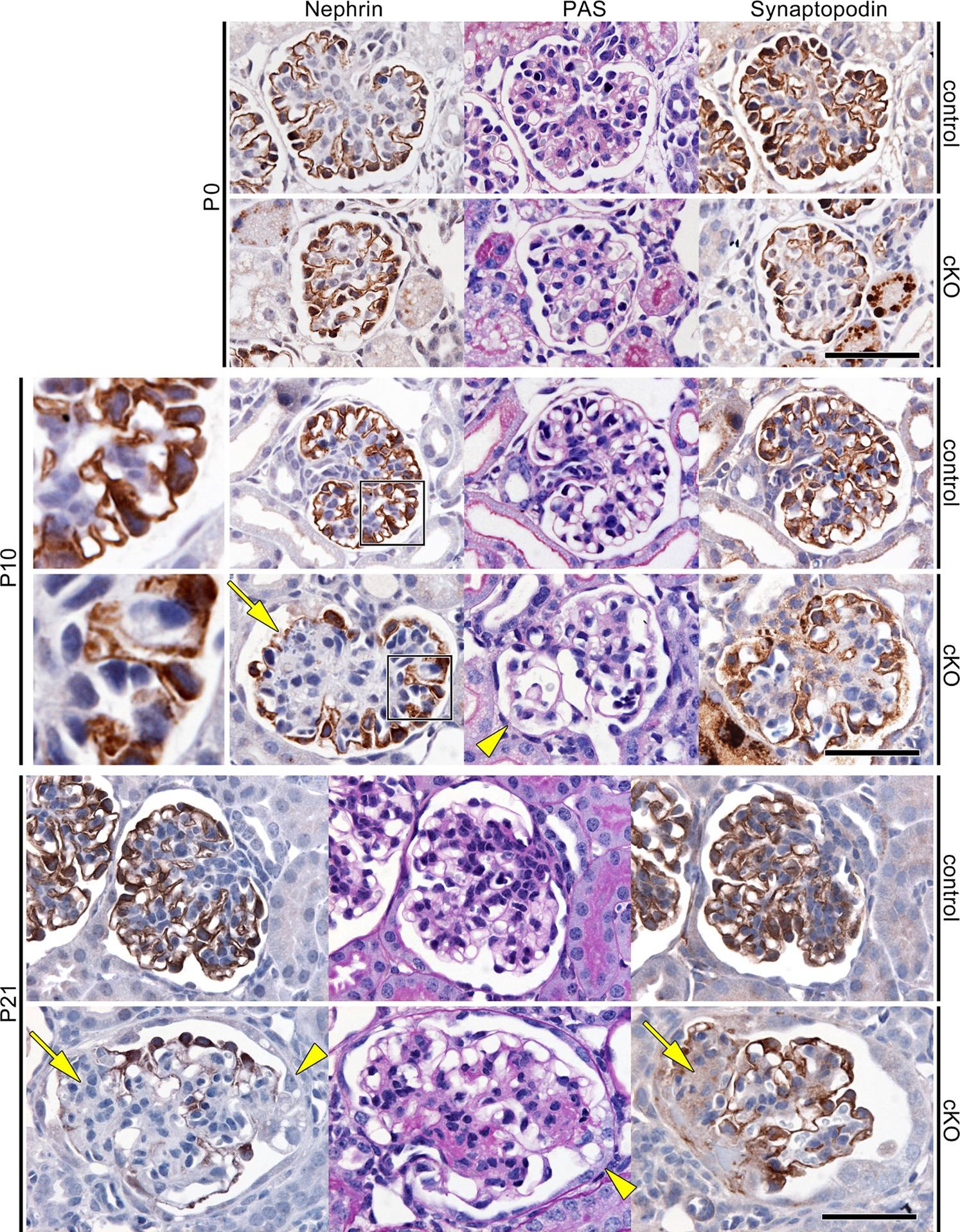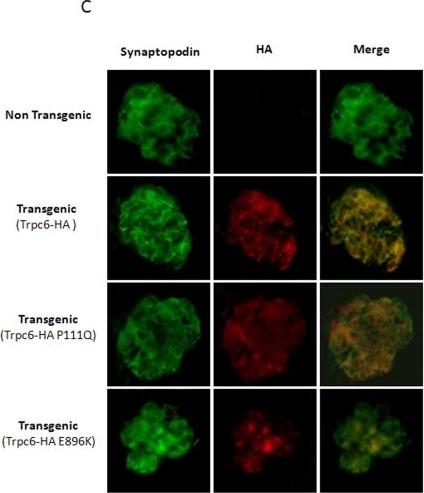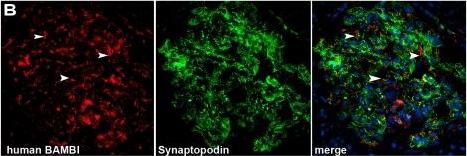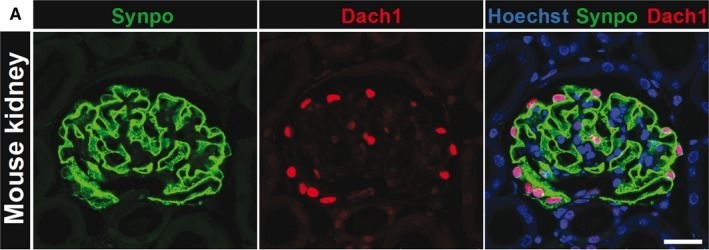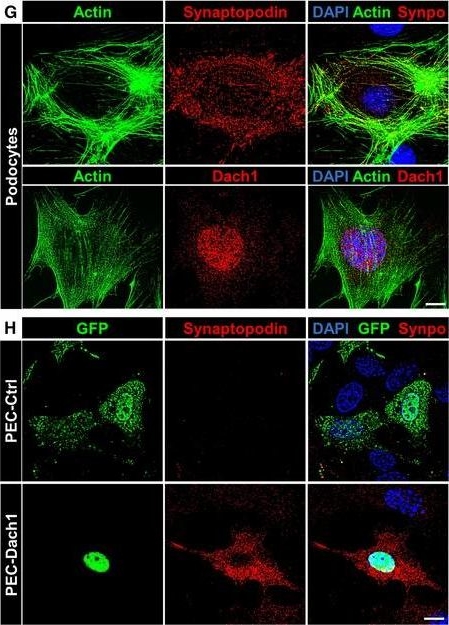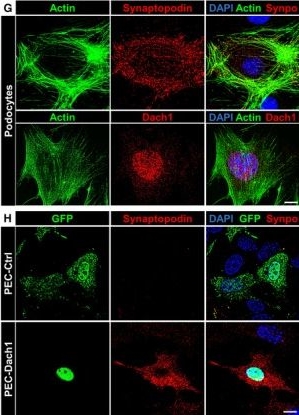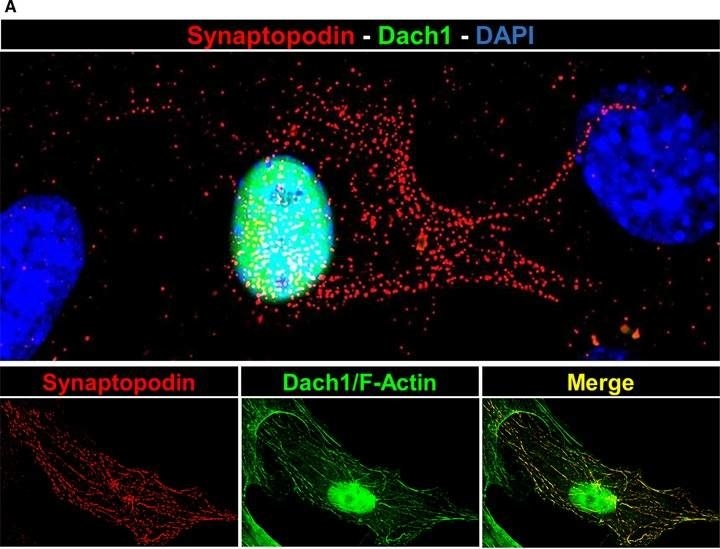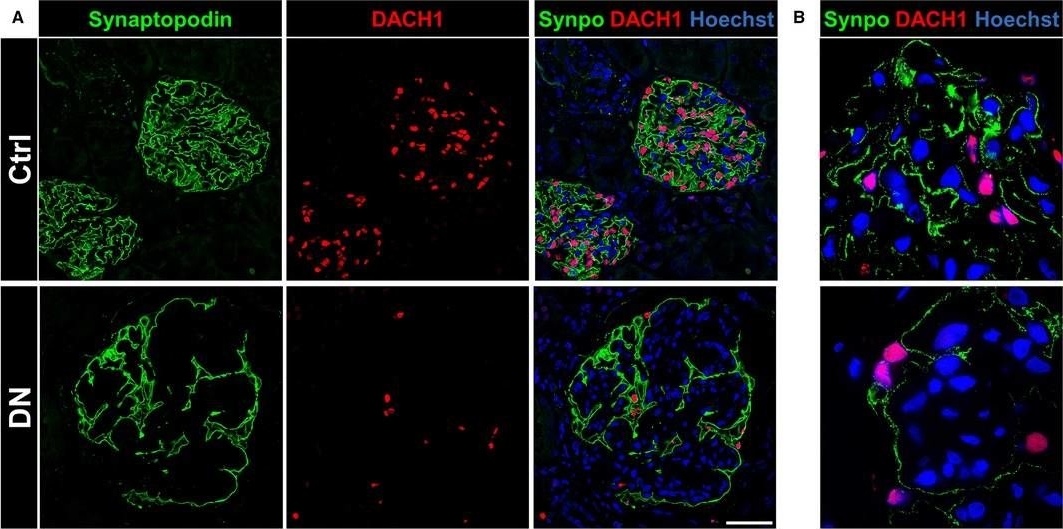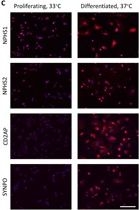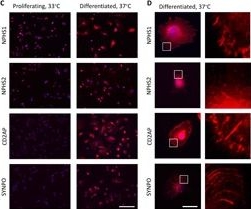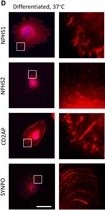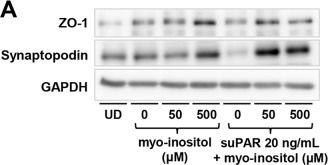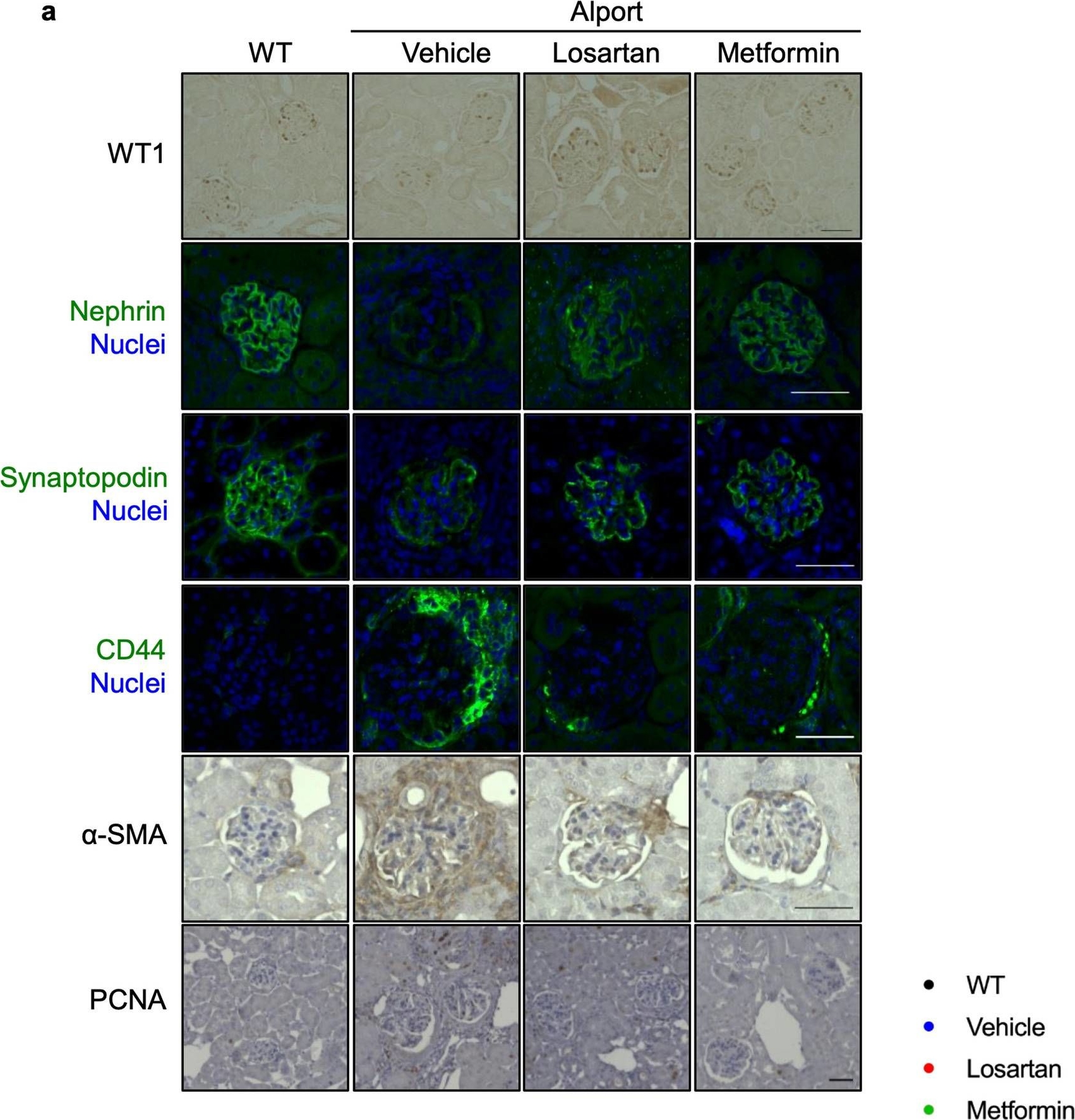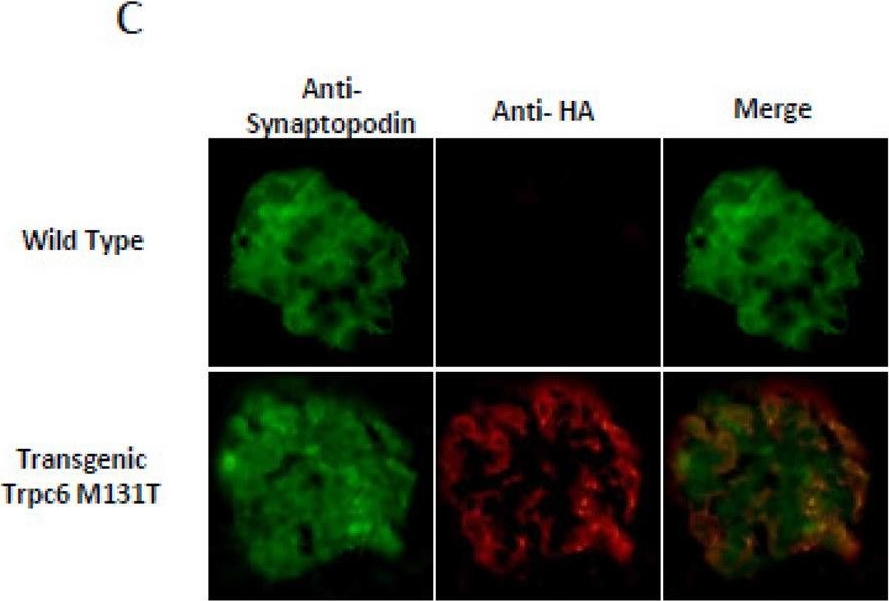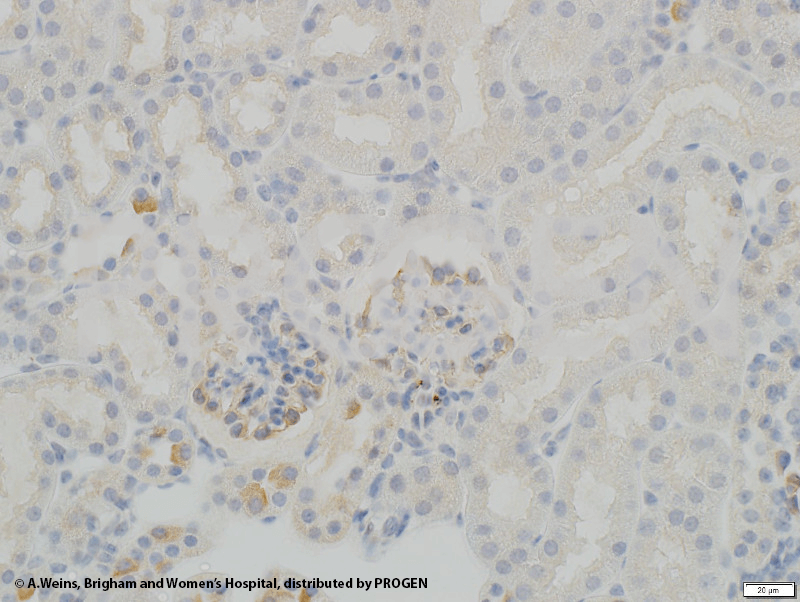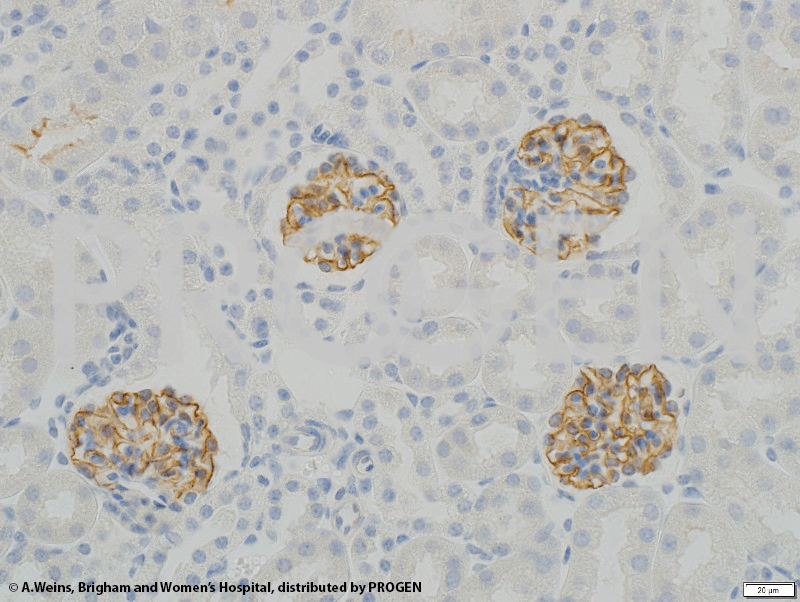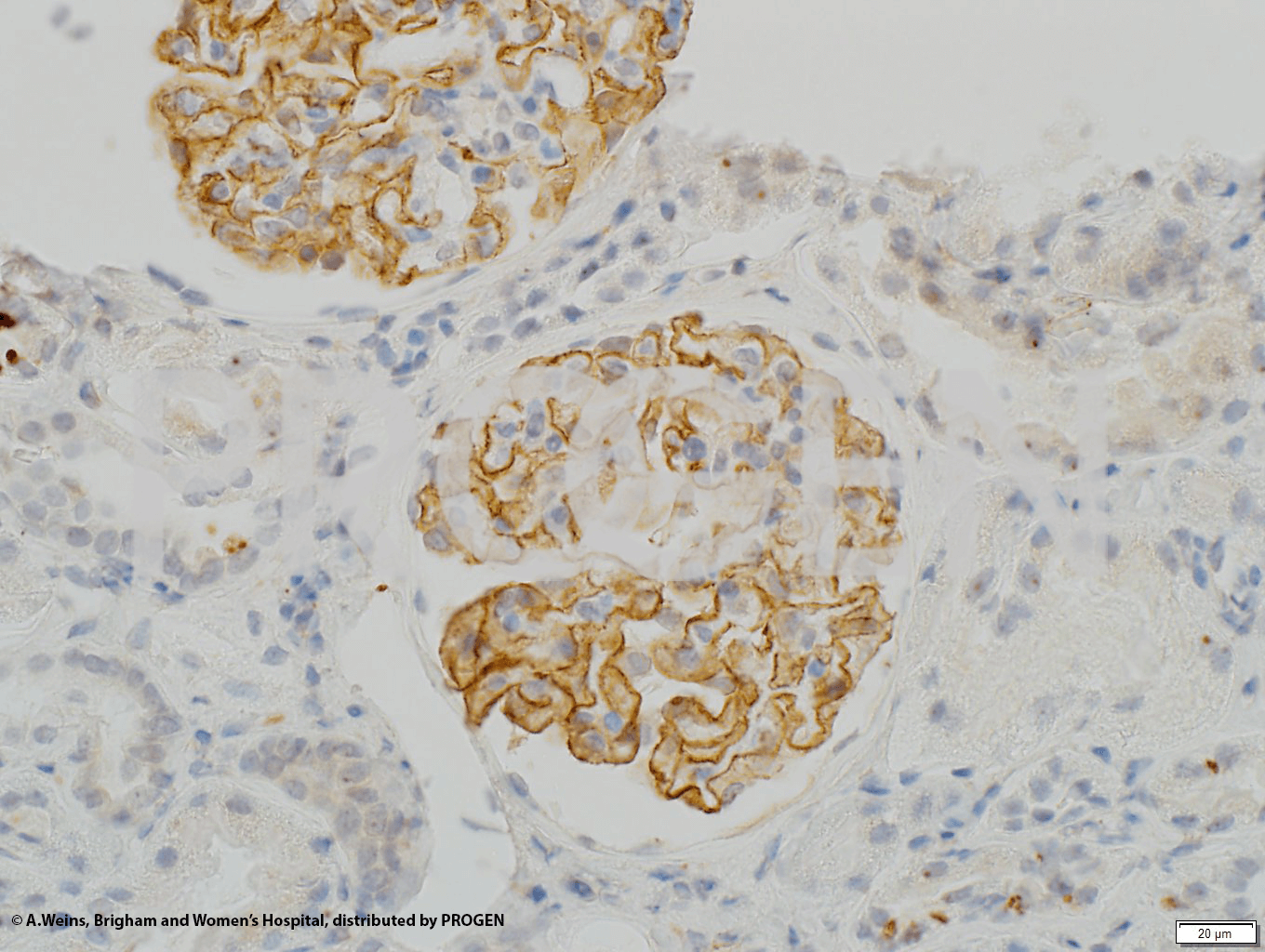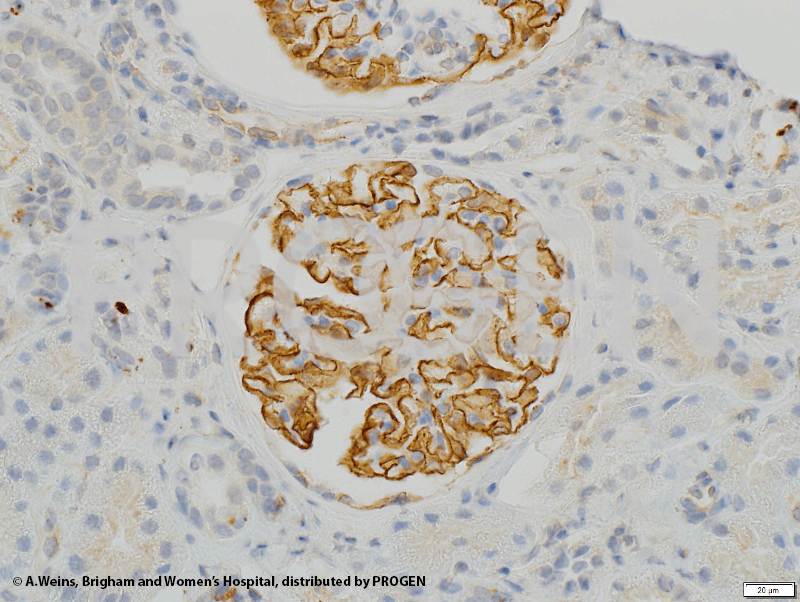Highly published
anti-Synaptopodin/SYNPO mouse monoclonal, G1D4, lyophilized, purified
Key Features
- Purified, lyophilized
- Mouse monoclonal
- Suitable for ICC/IF, IHC and WB
- Reacts with human, mouse and rat
- Isotype: IgG1
Product description
| Quantity | 50 µg |
|---|---|
| Antibody Type | Monoclonal |
| Host | Mouse |
| Isotype | IgG1 |
| Conjugate | Unconjugated |
| Application | ICC/IF, IHC, WB |
| Purification | Affinity chromatography |
| Reactivity | Human, Mouse, Rat |
| No reactivity | Chicken, Frog, Rabbit |
| Storage before reconstitution | 2-8°C until indicated expiry date |
| Storage after reconstitution | Up to 3 months at 2-8°C; long term storage in aliquots at -20°C; avoid freeze/thaw cycles |
| Intended use | Research use only |
| Clone | G1D4 |
| Immunogen | Isolated rat kidney glomeruli |
| Concentration | 50 µg/ml after reconstitution with 1 ml dist. water |
| Formulation | Lyophilized; reconstitute in 1 ml dist. water (final solution contains 0.09% sodium azide, 0.5% BSA in PBS buffer, pH 7.4) |
| UniprotID | A4IFK4 (Bovine), A0A286XK19 (Guinea pig), Q8N3V7 (Human), Q91YE8 (Mouse), D4A702 (Rat) |
| Synonym | Synaptopodin, SYNPO, KIAA1029 |
Applications
| Tested applications | Tested dilutions |
|---|---|
| Immunocytochemistry (ICC)/ Immunofluorescence (IF) | Assay dependent |
| Immunohistochemistry (IHC) - frozen | 1:50-1:200 |
| Immunohistochemistry (IHC) - paraffin | 1:50-1:200 (microwave treatment recommended) |
| Western Blot (WB) | Assay dependent |
Background
The antibody recognizes differentiated podocytes (glomerular visceral epithelial cells) in vivo and in vitro (weaker additional reaction with arterial endothelial cells), co-localization with alpha-actinin. Does not react with parietal cells. Reacts with a subset of exclusively telencephalic synapses. Differentiation-dependent expression during postnatal maturation of rat brain. Differentiation-dependent expression in cultured hippocampal neurons.
The antibody reacts specifically with synaptopodin, a prolin-rich actin-binding protein with 2 binding sites for actin. Synaptopodin represents a new class of actin-binding proteins which has first been localized in podocytes and a subset of telencephalic postsynaptic densities. In human tissue synaptopodin has a molecular weight of 73.7 kDa and pI of 9.38 (calculated from sequence data); in mouse the corresponding data are 74 kDa, pI 9.27. In SDS-PAGE the antigen appears as 100 kDa polypeptide in brain and 110 kDa polypeptide in kidney (the difference might be attributed to posttranslational modifications). In Western blot analysis the antibody also reacts with a 44 kDa degradation fragment of synaptopodin.
References/Publications (46)
Publication
Species
Application
Species
Human
Application
IHC-IF
Species
Mouse
Application
IHC-IF
Species
human
Application
WB
Species
rat
Application
IHC-IF
Species
rat
Application
IHC (paraffin)
Species
human
Application
WB
Publication
Tsuchida, Y. et al. Lipoprotein modulation of proteinuric renal injury. Lab.Invest. , (2019)
Species
mouse
Application
IHC
Species
human,mouse
Application
IHC-IF (paraffin)
Species
human,mouse
Application
ICC
Publication
Haley, K. et al. Podocyte injury elicits loss and recovery of cellular forces. Sci.Adv. 4, eaap8030 (2018).
Species
human
Application
ICC
Species
mouse
Application
IHC (paraffin)
Species
rat
Application
IHC-IF (paraffin)
Species
mouse
Application
IHC-IF (frozen)
Species
Rat
Species
mouse
Application
IHC (paraffin)
Species
human
Application
ICC-IF
Species
mouse
Application
IHC-IF (paraffin)
Species
human
Application
IHC (paraffin)
Species
rat
Application
IHC (paraffin)
Species
mouse
Application
IHC (frozen)
Species
mouse
Application
WB,IHC (frozen)
Species
mouse
Application
IHC-IF
Species
mouse
Application
IHC (frozen)
Species
mouse
Application
IHC (frozen)
Species
mouse
Application
IHC (paraffin)
Species
mouse
Application
WB,IHC (frozen)
Species
mouse
Application
IHC (frozen)
Species
human
Application
IHC (frozen)
Species
mouse
Application
IHC (frozen)
Species
human
Application
IHC-IF
Species
mouse
Application
IHC
Species
mouse
Application
IHC
Species
human,mouse
Application
IHC (paraffin)
Species
human
Application
IHC (frozen)
Species
human
Application
ICC-IF
Species
rat
Application
IHC (paraffin)
Species
human
Application
IHC
Species
mouse
Application
ICC-IF
Species
human,mouse,rat,bovine
Application
IHC (frozen),IEM
Species
mouse
Application
IHC (paraffin)
Species
human
Application
IHC (paraffin)
Species
human
Application
IHC (paraffin)
Species
rat
Application
WB,IHC (frozen),IEM
Species
mouse
Application
ICC-IF
Species
human,mouse
Application
ICC-IF
Species
human,rat
Application
IHC (frozen),IEM
Downloads
File
Category
Size
Filetype
Q & A's
There aren't any asked questions yet.
Customer Reviews
Login
FAQs
The concentration of unpurified supernatant, ascites, unpurified guinea pig serum and unpurified rabbit serum is not determined.
The concentration of purified antibodies is mentioned on the datasheet.
For prediluted antibodies the concentration may vary from lot to lot. The concentration of these antibodies is not mentioned on the datasheet and can be requested at support@progen.com.
The concentration of purified antibodies is mentioned on the datasheet.
For prediluted antibodies the concentration may vary from lot to lot. The concentration of these antibodies is not mentioned on the datasheet and can be requested at support@progen.com.
Most of our purified mouse antibodies contain 0.5% BSA as stabilizer. If BSA was added to the antibody solution, it is stated in the datasheet.
The supernatant format contains FCS proteins from cell culture medium supplemented with FCS.
The serum antibodies contain other proteins present in serum.
The supernatant format contains FCS proteins from cell culture medium supplemented with FCS.
The serum antibodies contain other proteins present in serum.
Please find the solvent for reconstitution and the amount of liquid for reconstitution on the antibody datasheet. The buffer formulation after reconstitution is also mentioned in the datasheet.
PROGEN offers different formats for mouse monoclonal antibodies. Different antibodies may not be offered in each format, the following are all possible formats:
- Supernatant and supernatant concentrate: This format contains hybridoma cell culture supernatant. The antibody is not purified and the antibody concentration is not determined. The antibody concentration may vary from lot to lot. Therefore we recommend to titrate the optimal concentration for the application used for each new lot.
- Lyophilized, purified: This format contains purified antibody in lyophilized form. The reconstitution of this antibody is described in the datasheet. The buffer composition after reconstitution is also mentioned on the datasheet.
- Liquid, purified: This format contains purified antibody in liquid format. The concentration is mentioned on the datasheet.
- Prediluted, purified: This format contains purified antibody in liquid format. Most antibodies in this format are diluted to be ready-to-use for IHC with standard tissue. But some antibodies of this format need further dilution for IHC. This is mentioned on the datasheet.
Lyophilized antibodies can be stored at 2-8°C until expiration.
Most of our liquid antibodies and reconstituted lyophilized antibodies may be stored for short term storage (up to 3 month) at 2-8°C. For long term storage we recommend to store the antibody at -20°C in aliquots. Please avoid freeze and thaw cycles.
Most of our conjugated antibodies should be stored at 2-8°C.
The individual storage conditions are mentioned on the datasheet.
Most of our liquid antibodies and reconstituted lyophilized antibodies may be stored for short term storage (up to 3 month) at 2-8°C. For long term storage we recommend to store the antibody at -20°C in aliquots. Please avoid freeze and thaw cycles.
Most of our conjugated antibodies should be stored at 2-8°C.
The individual storage conditions are mentioned on the datasheet.
The expiration date of our antibodies is indicated on the product label.
We offer bulk amounts starting from 1 mg for many of our mouse monoclonal or recombinant antibodies. Please contact us for further information or use the “bulk button” on the product page.
Most of our antibodies contain 0.09% sodium azide as preservative. If a preservative is added, it is mentioned in the datasheet.
The optimal antibody dilution for your specific protocol and application needs to be titrated in your lab with your equipment and sample. The optimal dilution may vary between protocols and samples. A good dilution for starting the titration is the dilution mentioned in the datasheet. If the sample needs a specific treatment (eg. Antigen retrieval for IHC on FFPE sections) this should also be mentioned on the antibody datasheet.
PROGEN antibodies are shipped at ambient temperature. The antibodies are stable at ambient temperature for the shipment period. Please store the antibodies as indicated in the datasheet upon arrival.

